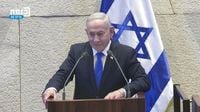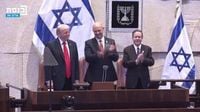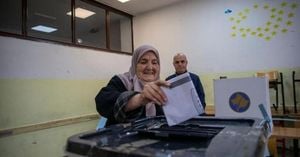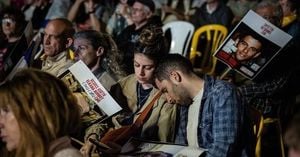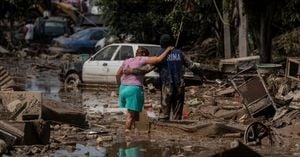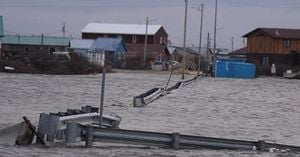On October 13, 2025, the usually solemn halls of the Israeli Knesset were alive with applause, anticipation, and, for a moment, the hope that the Middle East was on the cusp of a new chapter. President Donald Trump, visiting Israel at the invitation of Prime Minister Benjamin Netanyahu, stood before lawmakers, diplomats, and families of hostages, declaring, “This is the historic dawn of a new Middle East.” The day marked the release of the last living Israeli hostages held by Hamas and the beginning of a ceasefire that, for the first time in two years, brought a fragile calm to a region battered by relentless conflict.
Trump’s speech was anything but routine. With the ink barely dry on a deal that saw the exchange of Palestinian prisoners for Israeli hostages, the former U.S. president was introduced by the Knesset speaker as “the best friend Israel has ever had in the White House.” Netanyahu, echoing the sentiment, told the assembly, “President Donald Trump will be inscribed in the history of our nation.” According to ABC News, Netanyahu’s praise was effusive, describing Trump as “a dear friend of the Jewish people.”
The ceasefire, brokered with Trump’s direct involvement, halted a war that began with the shocking Hamas attack on Israel on October 7, 2023. That day, more than 1,200 Israelis were killed and about 250 kidnapped, Israeli officials reported. In the two years that followed, the toll in Gaza was devastating: over 67,000 Palestinians killed, according to the Hamas-run Gaza Health Ministry. For many, the violence had seemed endless—until now.
“This long and difficult war has now ended,” Trump announced, his words punctuated by cheers and a sea of red hats emblazoned with “Trump The Peace President.” He described the moment as the end of a “painful nightmare” for both Israelis and Palestinians. “After so many years of unceasing war and endless danger, today, the skies are calm, the guns are silent, the sirens are still, and the sun rises on a Holy Land that is finally at peace,” Trump told the Knesset, as reported by BBC.
Yet, the optimism in the chamber was tempered by the enormity of the challenge ahead. As Trump himself acknowledged, “challenges remain in ensuring a lasting peace in Gaza and questions abound about what comes next.” The ceasefire’s first phase involved the return of hostages and prisoners, but the fate of some captives and the remains of those who died in captivity remained unresolved.
Netanyahu, in his own address, marked the significance of the day in the Jewish calendar, saying, “Today, the Jewish calendar marks the end of two years of war.” He stressed his government’s commitment to peace, telling Trump, “You are committed to this peace, I am committed to this peace…we will achieve this peace.” According to The Times of Israel, Netanyahu emphasized, “No one wants peace more than the people of Israel.”
Netanyahu used the occasion to publicly thank Trump for what he described as five transformative decisions during his presidency. “This is your first visit to Israel since you recognized Jerusalem as our capital and moved the embassy here,” Netanyahu said. “Thank you for recognizing Israeli sovereignty over the Golan Heights. Thank you for standing up to the lies against Israel in the United Nations. Thank you for recognizing in your 2020 peace plan our rights in Judea and Samaria, the ancestral homeland of the Jewish people. Thank you for supporting Israeli military operations against Iran.”
Netanyahu credited Trump with playing an "indispensable role" in the hostage negotiations, stating, “At the beginning of the war, I promised to bring all the hostages home. Today, with the indispensable help, the determined and focused help, the unremitting help of President Trump...and with the incredible sacrifice and courage of the soldiers of Israel, we are fulfilling that promise.”
In recognition of Trump’s efforts, Netanyahu made a striking announcement: he had nominated Trump for the Israel Prize, the nation’s highest civilian honor, and would support his nomination for the Nobel Peace Prize. “There is no one more deserving than you, Mr. President,” Netanyahu declared. The audience responded with a standing ovation, underscoring the depth of gratitude felt by many in the chamber.
Trump’s speech was not without controversy. As he spoke, two opposition lawmakers—Ayman Udah and Ofir Kassif—stood and unfurled a banner reading “genocide,” momentarily disrupting the proceedings before being escorted out. But the overall mood was one of celebration, with Trump’s daughter Ivanka, son-in-law Jared Kushner, and a roster of former administration officials—including Secretary of State Marco Rubio and Defense Secretary Pete Hegseth—looking on.
Trump did not shy away from political jabs, criticizing his predecessors Joe Biden and Barack Obama for what he called a “hatred toward Israel” and touting his administration’s withdrawal from the Iran nuclear deal. He also made an unexpected plea, asking Israel’s President Isaac Herzog to pardon Netanyahu, who is currently on trial for bribery, fraud, and breach of trust. “That was not in the speech, as you probably know, but I happen to like this gentleman right over here, and it just seems to make so much sense,” Trump said, prompting a round of applause.
After the Knesset session, Trump traveled to Sharm El-Sheikh, Egypt, to participate in an international peace summit with more than 20 world leaders. The summit aimed to chart the next steps for Gaza and the wider region. Netanyahu, citing the proximity of a Jewish holiday, declined to attend but expressed gratitude for Trump’s invitation and “efforts to expand the circle of peace—peace through strength.”
The ceasefire agreement remains delicate. The first phase brought home hostages and freed prisoners, but the road ahead is uncertain. “If you would have gone on for three, four more years, keep fighting, fighting, fighting. It was—it was getting bad. It was getting heated. The timing of this is brilliant,” Trump recounted telling Netanyahu. “I just want to congratulate you for having the courage to say, ‘That’s it. We’ve won, and now let’s enjoy our lives, and let’s rebuild Israel and make it stronger and bigger and better than it’s ever been before.’”
The day’s events were not just about politics—they were about families reuniting, a region exhaling, and the world watching to see if, this time, peace could truly take root. As the sun set over Jerusalem, the refrain from both leaders was clear: the war, for now, was over, and the pursuit of lasting peace had, at last, begun anew.
